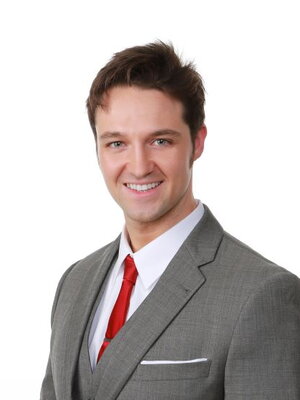
Dr. Jake Carpenter-Thompson serves as the director of clinical research at the Kutcher Clinic for Sports Neurology. He recently published research in conjunction with Dr. Jeffery Kutcher regarding the evaluation and management of sports-related concussions. He and his team are currently working on an assessment of technologies that claim to be able to diagnose a concussion. “When you look at previous research that’s been done, the quality is not there,” he said. “We’re applying a very rigorous clinical diagnosis of concussion, making sure that the way that these technologies are studied is appropriate.”
Dr. Carpenter-Thompson elaborated on more of the work he does at the Kutcher Clinic. “We work with a multitude of organizations,” he said. “Including local teams such as the Detroit Red Wings and Detroit Lions. I also consult with the professional lacrosse league and serve as the assistant team neurologist for USA skiing and snowboarding. Most recently, we became the neurological consultants for the WWE.”
The brain has always been very interesting to Dr. Carpenter-Thompson. “It’s always been that one part of the body we don’t understand, and we really still don’t fully understand it,” he said. “This makes it a fertile area for research. Issues with your brain are super important, and people can be so concerned, so it’s nice to be an expert in the field and be able to help people, number one, get better, and number two help relax people’s fears. When we take the time with them, and go through all their symptoms, and go through their concerns, we can provide the much-needed reassurance that ‘no, your brain is not broken’ this is what’s causing your symptoms, and this is how we can treat you.”
He remembers being impressed with UIUC when he visited. “When I came to the University of Illinois, I thought it was awesome,” he said. “I loved the people. I loved everything about it. The medical scholar program, also known as the MD/PhD program, was unique, because, unlike many other programs, it was integrated, meaning that while you were doing your medical school, you’re also completing your Ph.D., and my Ph.D. was in Neuroscience program, and I absolutely loved it.”
Dr. Carpenter-Thompson recalls clearly his experience doing research at U of I on tinnitus. “We were looking at the neural correlates, and one of the things that I found was that when you ask people who have ringing in the ears ‘How bothersome is it?’ that doesn't necessarily match up with how loud the noise is, or the pitch of the noise,” he said. “It’s more of a subjective, how bothersome is it to the person, and that’s different, so you can have a really loud tinnitus, and it doesn’t bother you that much, so it’s not considered severe tinnitus. I worked in conjunction with Dr. Fatima Husain and Dr. Edward McAuley, and we found that people who were more active had less bothersome tinnitus and areas of their brain that were responsible for negative emotions were also less active. Areas in the front of the cortex, which help with top-down control of emotional response, attention, and executive functioning, those areas were more active. So physical activity gave these people better tools to utilize those frontal regions to modulate their mood and make their tinnitus less bothersome.”
Looking back, Dr. Carpenter-Thompson is grateful for where he ended up. “I did my PhD at the University of Illinois and graduated in 2018.” He said, “From there, I went to the University of Chicago, where I did a residency in Neurology. There were two Sports Neurologists working with the University of Chicago health system, so I got some exposure to their clinics and really fell in love with the specialty. Then, they connected me with Dr. Jeffry Kutcher, who is the leader in the field of sports neurology. I did a fellowship with him in Detroit, Michigan. From day one we really clicked, and everything lined up, and I took a job working with him as a partner at the Kutcher Clinic. Being able to do what I do now is a blessing, and I am very grateful.” Dr. Carpenter-Thompson recalls his time at the University of Illinois fondly. “I think that the University of Illinois prepared me well,” he said. “I was taught how to think critically and explore unanswered questions as a PhD student in the Neuroscience program. Nothing but fond memories from the University of Illinois.”